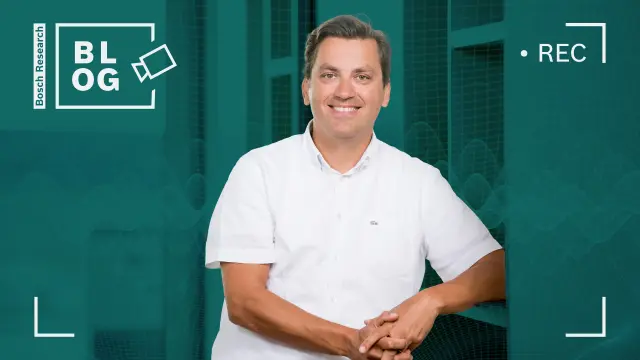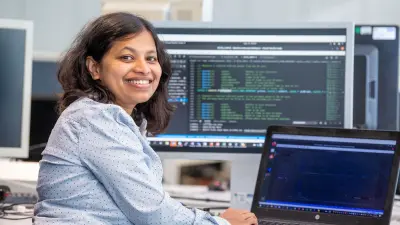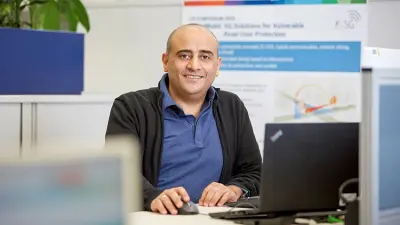Dr. Arne Hamann
Chief Expert in Distributed Intelligent Systems & Head of Advanced Solutions for Intelligent Systems at Bosch Research
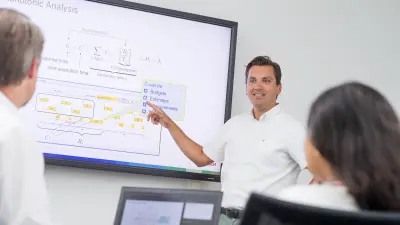
I work as Chief Expert for the development of distributed intelligent systems. Like the Bosch product portfolio, our range of activities is very broad, encompassing complex embedded systems where the interaction between physical processes, hardware and software plays a major role, through to IoT systems with elements of (edge) cloud computing.
Please tell us what fascinates you most about research.
First of all, I am motivated by working on problems in the development of distributed hardware/software systems. The complexity of modern connected applications is extremely high. Building them efficiently and correctly requires new approaches and technologies which are often at the interfaces between various disciplines. This interdisciplinary research is challenging and extremely fascinating.
What makes research done at Bosch so special?
I am often asked this question by research colleagues from academia. At Bosch Research, we have succeeded in creating sufficient space for exploring and pursuing innovative approaches on the one hand and on the other hand, we are very well connected to our divisions enabling us to deploy the results achieved in actual product development. In this combination, Bosch Research is practically unique at international level.
What research topics are you currently working on at Bosch?
One key aspect of our research entails mastering complexity. And one question concerns, for example, how we can abstract technical details and specifics of the underlying distributed execution platform for function developers. Our engineers should be able to concentrate on the functional challenges. Mapping the functionalities and configuration of the distributed platform should be automated and tool-supported in such a way that specified Quality of Service (QoS) requirements are satisfied. In doing this, we can not only drastically improve development efficiency, but also allow simple porting of distributed functionalities to other platforms.
What are the biggest scientific challenges in your field of research?
At Bosch, we are very good at building resource-efficient embedded systems with QoS guarantees such as predictable real-time performance, for example. One of the greatest challenges is to extend this core competence to the area of general information technology (IT). This is essential as many modern Bosch products are distributed cyber-physical systems based on IT technology where end-to-end QoS guarantees play a central role. Examples include service-oriented middlewares in automotive and robotics, IoT and vehicle-to-X applications where some critical functionality is computed in the (edge) cloud or systems in connected manufacturing which use wireless communication protocols for coordinating production modules.
How do the results of your research become part of solutions "Invented for life"?
In the relatively abstract “computer science topics” we are working on, the influence of our research results is usually not directly apparent and cannot be experienced immediately by our customers. And that is exactly the way it should be: the software-intensive Bosch products to which we contribute should simply work and do their job. That is our contribution.
Curriculum vitae
2017-2019
Project lead: Mastering heterogeneous applications and parallel hardware platforms, Performance analysis of heterogeneous HW/SW systems, constructive mechanisms for mastering parallelism, portability and compositionality
2014-2015
Project lead: Robotic systems and software engineering, Model-based SW development methods for robotics, consideration of real-time aspects in robotic middleware systems
2008
Doctorate in design and optimization of embedded real-time systems, HW/SW co-design, scheduling analysis, optimizing real-time performance and its robustness, TU Braunschweig
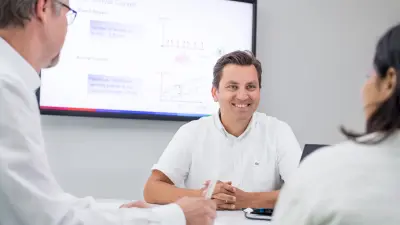
Selected publications

A. Hamann et al. (2017)
- Arne Hamann, Dakshina Dasari, Simon Kramer, Michael Pressler, Falk Wurst
- 29th Euromicro Conference on Real-Time Systems

S. Kramer et al. (2015)
- Simon Kramer, Dirk Ziegenbein, Arne Hamann
- 6th International Workshop on Analysis Tools and Methodologies for Embedded and Real-time Systems (WATERS)

G. Frehse et al. (2014)
- G. Frehse, A. Hamann, S. Quinton, M. Woehrle
- IEEE Real-Time Systems Symposium

A. Hamann et al. (2004)
- Arne Hamann, Marek Jersak, Kai Richter, Rolf Ernst
- 25th IEEE International Real-Time Systems Symposium
Get in touch with me
Dr. Arne Hamann
Chief Expert in Distributed Intelligent Systems & Head of Advanced Solutions for Intelligent Systems at Bosch Research
